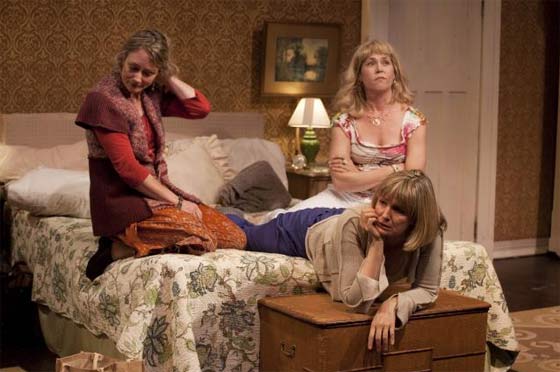In today’s Wall Street Journal drama column I review two first-class shows that I saw on the road this past week, Shakespeare & Company’s The Memory of Water in Massachusetts and the Peterborough Players’ Ancestral Voices in New Hampshire. Here’s an excerpt.
* * *
Sometimes familiarity breeds not contempt but delight. The dramatic potential of funerals, for instance, is well known to playwrights and screenwriters, since they typically trigger the kind of razor-sharp focus on family life and its discontents that is the stuff of good theater. Yet the subject of death and its immediate aftermath, however familiar it may be, remains inexhaustibly fertile, and Shelagh Stephenson’s “The Memory of Water,” which had its English premiere in 1996 and was first seen Off Broadway two years later, is a prime example of a play that turns an oft-told tale into something fresh and immediate. So, too, is Shakespeare & Company’s revival a wholly satisfying piece of work, a show full of bull’s-eye moments that make you sit up straight in your seat and say, “I’ve been there–that’s just how it is.”
 One of the reasons why “The Memory of Water” rings so true is that the three bereaved sisters who are its central characters are portrayed with such eccentric individuality that you can’t help but suspect that they were drawn from life. Played to perfection by Elizabeth Aspenlieder, Corinna May and Kristin Wold, they flounder in the dark waters of sorrow, squabbling one moment and giggling together the next, each unable in her own way to come to terms with the memory of their gravely flawed mother (Annette Miller).
One of the reasons why “The Memory of Water” rings so true is that the three bereaved sisters who are its central characters are portrayed with such eccentric individuality that you can’t help but suspect that they were drawn from life. Played to perfection by Elizabeth Aspenlieder, Corinna May and Kristin Wold, they flounder in the dark waters of sorrow, squabbling one moment and giggling together the next, each unable in her own way to come to terms with the memory of their gravely flawed mother (Annette Miller).
Like an old-time prospector, Ms. Stephenson is forever finding glittering nuggets of dialogue in her pan: “Your idea of getting somewhere was marrying a dentist in a sheepskin coat from the Rotary Club.” “The funeral director’s got a plastic hand.” “I don’t think that colonic irrigation was a very good idea. Not for Alzheimer’s.” But while “The Memory of Water” plays like a comedy for much of its length, many of its most impressive moments take place when the laughter dies away without warning and the characters are overwhelmed by remembered anger and present pain….
A.R. Gurney is another playwright who rarely fails to find new things to say about old subjects, and “Ancestral Voices” ranks among his strongest efforts in that line, a portrait of a family of old-money WASPs from upstate New York whose tight ranks have been cloven by the wedge of divorce. First presented by New York’s Lincoln Center Theater in 1999, “Ancestral Voices” was written to be done as a staged reading by five actors who play multiple roles and remain seated throughout the show–but Gus Kaikkonen, artistic director of New Hampshire’s Peterborough Players, has chosen instead to mount it as a fully staged play performed by a cast of 13. Though I can’t say whether Mr. Gurney would approve, Mr. Kaikkonen has directed “Ancestral Voices” with such fluidity and attention to detail that it works at least as well in this new form.
I confess with embarrassment to having misjudged “Ancestral Voices” when I saw the original production. Back then it struck me as a white-bread rewrite of Woody Allen’s “Radio Days.” Now I find it extraordinarily moving, a searching look at a class of once-confident Americans who have (in the words of one of the characters) “lost our usefulness” and are seeking new ways to live, some more successfully than others….
* * *
Read the whole thing here.
Terry Teachout on the arts in New York City
An ArtsJournal Blog
